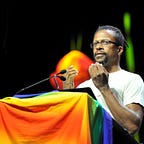Sacred Choices
“You have to pick. That’s the fundamental problem. And one interest has to prevail over the other at any given point in time, and that’s why this is so challenging, I think.”[1] — Justice Brett Kavanaugh during opening arguments in Dobbs v. Jackson Women’s Health, Dec. 1, 2021
Where is the voice of liberal religion in the spiritual debate about abortion? Is liberal religion only concerned with the secular question of personal liberty and autonomy? For liberal religion, does reason vacate any sense of the divine?
The insistence by some people to have a secular argument about something that is a uniquely spiritual question for others is always problematic. The primary basis for the anti-abortion argument is the religiously motivated question of when life begins. Either there is life, or there is no life. This is what sits subtly behind Kavanaugh’s statement. The definition of “life” may be scientific, but the impulse to raise the question is, for most religious conservatives, deeply spiritual.
Liberal religion has the potential to be a powerful spiritual language in this conversation and would do well to reclaim some of its power of persuasion at the table. Liberal religion is woefully thin when it boils itself down to reason only; indeed, when it does so, it stops being religion altogether and becomes politics. What is most useful about liberal religion as it has evolved in today’s world is its capacity to hold complexity. Within these spaces and communities and theologies, there is not just the space for reason but also the ability to fully embrace divergent religious belief, diverse embodied experience and conflicting political agendas.
These are ethically expansive spaces where humanity in all of its variation is held at the center. As a result, liberal religion calls us to a deeply nuanced understanding of what it means to create life. It asks us to think about the fact that people who are able to become pregnant hold incredible responsibility. But more than responsibility, they hold immense power that informs us all what it means to be alive. Within their bodies is not only the ability to bring life into existence (for no fetus ever willed itself into being) but also, the ability to end that life, either by naturally occurring or artificial means. It is this dual potential for life and death that becomes an embodied expression of human wholeness.
Indeed, birth does not come without death. We “learn” death from the fact that we are born. Once you are born…even once a being is conceived, it is capable of death…and the death of the body is inevitable. This is at the heart of human being…even in the most God-centered religious beliefs. The ability to create life from within the body (whether you believe it comes from God or science or both) does not come without the inevitability of the end life. This is the awesome power of one of the most important theologies of womanhood* that is so often missed in a male-dominated phallocentric society.
The pro-choice movement is not doing itself any favors by totally secularizing the argument. Our embodiment is not exclusively political or governmental. It can’t be. Embodiment is emotional, sensual, ethical, individual, communal and by extension for some, spiritual and profoundly religious. As I look at it, the pro-choice movement actually has a much stronger spiritual argument than the anti-abortion movement because it can embrace the fullness of the spiritual mandate that is embodied in the potential to create mortal life. In fact, the pro-choice movement is more pro-life than the pro-lifers. Women and people who give birth are the only ones who introduce every single human to the fragile balance between life and death that we call “being.” Denying them the totality of that power, responsibility and the divine genetic script because of politics or narrow enforcement of human imposed orthodoxies is a violation of their total humanity.
People who believe that the spirit animates us from conception and who insist that intentionally ending pregnancy is a crime (against God), are not wrong. But they must remember that their definition of life that is based on their religious view of the world is not shared by everyone. Nor can it be, nor should it be. Alternately, people who do not adhere to a religious framework and who insist that the right to one’s body is an inalienable right that can never be infringed upon in a secular society are also not wrong. But they must remember that we co-exist with the kaleidoscope of ways in which each of us (sometimes individually and sometimes in community) make sense of knowing we are alive while also knowing that we will die. This is knowledge that is most often answered in our world by religion. Liberal religious perspectives provide language and frameworks to carry both.
I will pray that the current debate about a woman’s right to choose the arc of pregnancy is decided in such a way that embodied, spiritual or human rights are held with greatest care. From a liberal religious perspective, I believe it is possible. Despite what Justice Kavanaugh and other conservatives on the court say, it is not a choice of one or the other, but really must be a “both, and.” Sadly, the courts have never done “both, and” well (think Plessy v. Ferguson.)
One thing is for sure, although all of us know we will die, none of us knows that we will be born. That is a sacred, exclusive conversation held between God and/or being and those who are blessed with the bodies in which we are conceived. No court or law required.
-ALD
[1] Dobbs v. Jackson Women’s Health, p. 106.
* Here I am referencing womanhood that is not defined by birth or assigned gender…rather womanhood that can contain both.
Originally published at https://spirituwellness.com on December 5, 2021.
